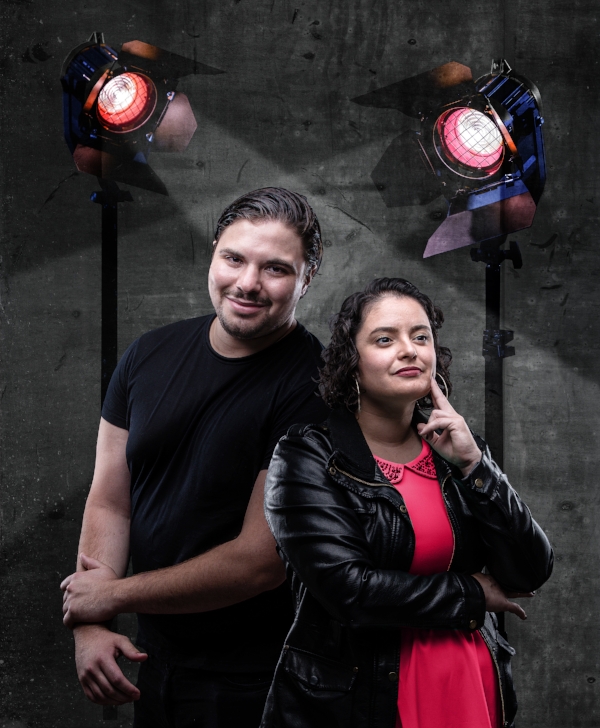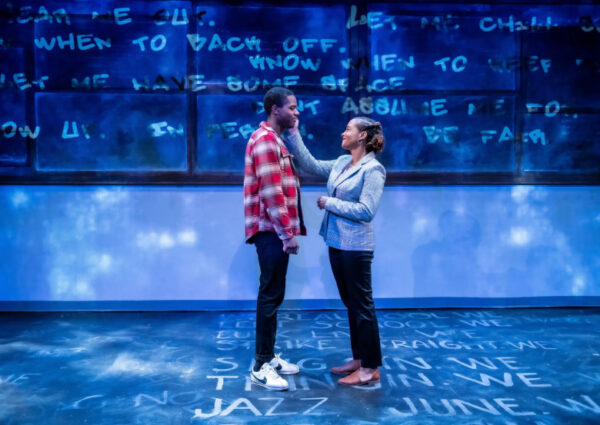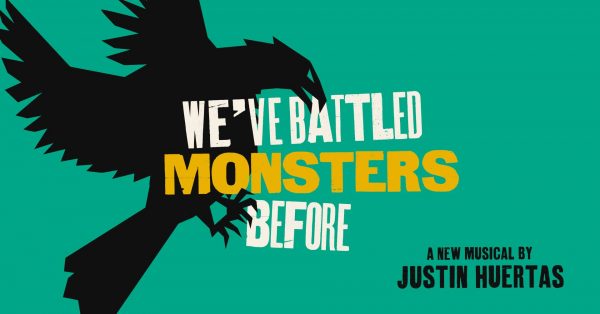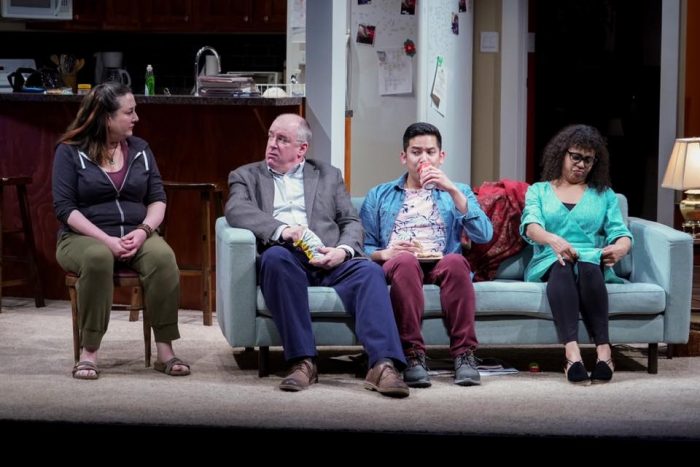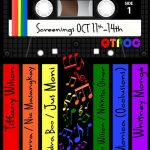
Marco Voli and Ana Maria Campoy star in Seattle Public Theatre’s FADE opening October 12 and running through Nov 4, 2018. Photo: John Ulman
Pilar O’Connell directed FADE which opened Friday, October 12th at Seattle Public Theater and Rachel Delmar chats with the director/actor/theater creator about the play and the “Renaissance of Latinx” theater in Seattle and the challenges of creating this new production.
Per SPT’s description, Fade is a witty, true-to-life comedy, focused on Mexican-born Lucia who is hired to write for a ruthless Hollywood studio. She soon discovers that the studio’s Mexican-American custodian, Abel has a lot of great plot ideas but “as their friendship grows, his stories start to blur with hers, leading to unexpected consequences…”
-Michael Strangeways
Rachel Delmar: What’s this play about for you?
Pilar O’Connell: This play is a lot about the idea of being ‘other-ed’. And being other-ed due to your gender or your race or other ways in which you identify due to things you cannot control. And how we function in a society that is not built with a place for us. There is no spot for these people. And they have to exist within it and how do they fight for the things that they want in this society with these kinds of parameters. Whether it be for Lucia [one of the two characters in Fade] in a Cis White Male dominated workplace or for Abel [the second character in Fade], being a Mexican-American working in America which is a country that is not for him. It’s this idea of otherness and how you have to fight & claw your way up the ladder and while doing that who are you hurting. Are you climbing on the backs of fellow brown people. Of your own people. To get higher and higher. Do you have to do it with sacrificing other people?
Rachel: Why is now the time to do this play in Seattle?
Pilar: I think in general we have this Renaissance of Latinx work here. But I will also say that a lot of Latinx Work isn’t being supported by the bigger houses. It is a little bit now. But, I think it is important to remind ourselves and theaters that we are here and have been here and not going anywhere.
It is also important because it is about this woman, this woman who is trying to make her way in the world and she believes she should be (and she should be) treated equally to the other TV writers. I think what is happening in our world and how we’ve really learned that this country and this current government does not value womxn. It does not value People Of Color. This kind of theatre is relevant to what is going on in the world. And without relevance than what are we doing?
Rachel: They reference ‘Trump’s America’, so it is obviously a very recent play. Making it pointedly relevant due to things he has said about people of color, specifically Mexicans, and then, of course, women.
Pilar: I’m really interested to see what people come away with. It’s hard to talk about without giving away the twist. I hope people will have a lot of complicated feelings.
Rachel: Do you think it is important that it is set so specifically now?
Pilar: I think so. It’s one of those moments when you go to the theatre and it’s not necessarily escapism it’s just a different point of view of this moment in time. I hope that’s what our audiences see.
Rachel: I was talking to someone about Crazy Rich Asians & the demonstration of Classism that exists within the Chinese culture in it. I see a bit of that in Fade as well, not exactly the same, but a sort of hierarchy or something based upon where they were born.
Pilar: Absolutely. Classism within Latinx culture is very intense. There is the great reality tv show that just came out called “Hecho En Mexico “ and it is on Netflix and it is about Fresas. Which is basically a derogatory term for “privileged/stuck up/valley girl/common for white passing etc.”. Anyway, this show is about the Fresas who grew up in ‘Polanco‘ in Mexico City which is basically Beverly Hills. It’s people with the maids. It’s people who are almost unaware of their privilege at some point. I think there is a word for Fresa is every language…I can’t think of what it would be in English.
So this idea of classism right, there is this scene in Hecho En Mexico where you’re watching this girl talk to her maid and watching it from an outside perspective that they’re both Mexican but they have such vastly different realities. We have this everywhere, this huge divide because of class and money etc. And we have that here in Fade with Lucia and Abel.
A lot of the classism is dealt with skin politics. The darker you are in Mexico, you’re usually looked down upon. There is this idea that the more indigenous you look the lower class you are. The white passing Mexicans tend to get more attention as being successful and or more clout, a lot of the time those are the folks you see on TV like Paulina Rubio or Kate Del Castillo.
In this show the classism is very apparent. I think Tanya Saracho [the playwright] is very smart & she’s written these full characters without being too obvious. She reminds us of Lucia’s privilege constantly. So I think that’s really interesting.
Rachel: The universal nature of classism. ‘I’m better than you because of this, this, and this.’ That’s humanity. It exists everywhere seemingly.
Pilar: I think what is interesting about this play is that it is universal story. Even though it is so specific. Tanya’s writing a lot about this. She writes unapologetically Mexican. It is very culturally specific. But it’s not so much that other people won’t get it. There is this idea and journey of classism, as well as sexism. Abel is very machismo. Which is something that exists hardcore in that culture. So the journey of the sexism and classism is clear and universal so people who aren’t apart of the culture can watch it and be like oh yeah THIS. I’m a woman in the workplace and I see THIS. I lose work over THIS. The way I identify causes me to have to work harder.
Rachel: How do you see the use of Spanish in Fade? The use of it in dialogue but also the conversations that they have about speaking Spanish.
Pilar: I think the use of Spanish is very intentional. The play goes In and out, in and out all the time. We were in rehearsal yesterday and Ana & Marco were speaking in Spanish and they switch back into English. I think the use of Spanish is to keep these characters grounded. To never let us forget who they are and where they come from. It gives a key to the door but it isn’t all Spanish all the time. It reminds us who they are, and that they are in America. Especially what Abel says at the beginning of the play about her making an assumption about wanting to speak Spanish with people that look like her is another look into her privilege. Then him having to inform her that sometimes, they don’t let you speak Spanish at work. Because if you speak it at work people will look down upon you and pigeonhole you. And that is a look into him not having the privilege to get to speak Spanish whenever he wants, but she does. I think the Spanish is used as a device to show Lucia’s privilege again and where Abel exists within that.
Rachel: Who do you think Tanya wrote this play for and who are you doing it for?
Pilar: I think she wrote it for Latinx people. And I am doing it for Latinx people. I could see how some people could say otherwise but I don’t think it’s about educating white folks. It doesn’t come off like that to me. I hope Latinx people come in and see it and see themselves on stage and see these two vastly different parts of the culture and who they are. The theatre I’m interested in making is for a broader audience. We have a typical white older middle to upper class audience built in Seattle and yeah come see the show give us your money but also that’s not who I make the theatre I make for and I’m interested in cultivating a Latinx audience so they can see that shows like this exist and it’s not just Latinx folks as a token or accessory in a play for white people playing the Cholo or the maid etc. Long answer short question I think Tanya and I are on the same page with that.
Rachel: With our audiences and critics being predominantly white, I’m curious if you’ve had thoughts or conversations on what that experience is going to be like when they will be the majority commenting on & critiquing it.
Pilar: All due respect to everyone and their jobs, everyone has a job they have to do, and sometimes it doesn’t go so well, and sometimes it does, but if I’ve learned anything about making theatre in Seattle and the fact that my job is constantly judged whether I’m a director or an actor by people who get to publicly judge what I am doing and whether or not they like or dislike or don’t understand it and send it out to the masses…At this point I just don’t give a shit. At the end of the day I’m like, you do you and I’ll do me and this isn’t for you that’s cool and your thing isn’t for me that’s cool and if my culture is something that you don’t understand and that is what you get from a play that is not my problem.
(We laugh.)
Rachel: That’s great. And this stems into the bigger issue, how do we change that.
Pilar: How do we advocate for theatre in general? I don’t know, keep making relevant work, keep challenging the masses, keep doing the work even when someone tells us that it isn’t worth while.
Rachel: How, without giving things away, do you want people feeling when they leave? What do you want them to go home and talk about?
Pilar: I want them to feel complicated. I want them to both dislike and like each character and not be able to say this person is bad or this person is good. I want them to come out and see that these people are human. And ask themselves what would i do if i was in either position? We are all both good and bad.
I want the audience to question their morals a bit. Because I’ve been doing that and I think my actors have as well. This whole process we’ve been having long conversations about these people. Ana [Maria Campoy] who is playing Lucia, has to separate herself so much because she is such a warm person and doesn’t necessarily live fully in Lucia’s privilege. And so had had to separate herself out and find a way back in. And I think that’s been an interesting challenge for her. And for Marco I think it’s been the same thing. I don’t want anyone to make a solid decision when they leave. I want them to be thinking about it and then two days later be like oh actually maybe I would have done something different than I would have two days ago.
Rachel: There are so many different layers to think about in this, having just read it. And I am so excited to see it. With the culture, the race, the classism, the female-male entities, the office workplace, etc. I do think there is something for everybody in this.
Pilar: I agree.
Tanya is really smart. I cannot advocate for her more and everyone should watch Vida. It’s maybe one of the best tv shows I’ve ever seen in my life. It is on Starz or Amazon Prime.
Rachel: I would love for you to talk about the use of music in this show.
Pilar: Oh my god yes. I think it’s because I’m the daughter of a musician [Kenny Passarelli] but when I first started directing the first thing I did was create Spotify lists about and for the plays. This show specifically, almost all the music but one piece are Latinx artists a lot of it is very contemporary alongside some very beautiful older regional music. The way I’ve thought about it is that when I’m directing a piece, it’s like weaving a tapestry. Each piece of music and where exists very specifically to build us into the next moment. Because a lot for it is in Spanish, this is a special treat for the people who speak Spanish because they’ll hear things and think oh my god that makes so much sense why that’s right there. Or the first song in the show when you get to the end of the show you’ll think holy shit that makes sense. So for me sound is very inspirational. I have really good hearing and very bad eyesight so maybe it’s that. But the music in the show is awesome and Michael [Owcharuk] is such a good designer and really did his due diligence and research and let me be bossy about the music that I wanted to use. I had all this music and we sat down and really went through moment to moment, what do we want to convey at the end of this scene and how do we add that with music. What do we do at the end of the show. How can I make a meta-political statement with the music I’m choosing. And so it’s been really cool to make happen. I’m excited to use those subwoofers at Seattle Public and wake Green Lake up a little bit.
Rachel: How has it been directing a two hander?
Pilar: HARD. Oh god. It’s hard and I’ve performed in two handers and directing one is cool because I feel very collaborative with my actors. I feel like we are all directing the play. I know what I want and we just get to have conversations and hone in on but for the actors too – I performed in Fool for Love [ACT Theatre, 2017] – and learned you can never hide, you have to be there for each other, the director has to be there for them, and it is definitely an animal. The last show I directed Mariposas [by Benjamin Benne] had 4 people but most of the time it was 3 and so it is interesting. Staging a 2 hander is hard. Especially in Seattle Public’s space to make sure everyone can see everything. But I do think it would be a much more difficult process if I didn’t have such talented actors. They really are there for me and they allowed me to figure things out within myself and vice versa and we all have a happy and open room for conversation. Marco had an idea the other day – and it’s a genius idea – and I was like yeah, yes, let’s make that happen. If I didn’t have such open actors that already have such good instincts it would be much harder. They’re a dream.
Rachel: Was there anything you did specifically to prep for something like this? Knowing that it was going to be a much more intimate experience?
Pilar: Casting was part of it. Every person who came to audition was amazing. And I would like to give a special fucking shout out to the Latinx performers in this town because they are unreal. Seattle better be ready because every single one of them is on point. And i was so lucky to see so many people. But there was something about casting Ana and Marco that was just fate. Part of the prep was just, who are these two people. If these two people work and fit so well then we’re going to be golden. So that was first. Second, I’m lucky enough that the community is small so these are my friends. I know how to talk to them. And we understand each other. And we rarely come to impasses because we all know each other well. But then. I also read the play like 700 times.
Rachel: What’s been the hardest part so far?
Pilar: Not having imposter syndrome.
Rachel: Can you unpack that for me?
Pilar: Yeah. I feel very grateful and honored to be doing this. And so happy that Kelly and Annie [Seattle Public’s Co-Artistic Directors] and Seattle Public put this in my hands and believed in me but sometimes it’s still really scary to wake up and remember this is your baby. You make this piece of art and then everyone is going to see it and maybe they’ll hate it or maybe they’ll love it. I think every person who is an artist gets imposter syndrome. Especially when you go into a different medium. 5 years ago I never thought I’d be directing plays and now I’m directing all over the place and it’s crazy. So. I think that’s been what’s difficult for me. But, like I said, my actors and my team are so supportive that they remind me that it’s ok for me to be here.
Rachel: What’s your favorite moment in the play?
Pilar: There are a lot. As Abel and Lucia get to know each other more and build their relationship. There’s these little moments of how they start to care for each other. There’s one where he’s talking about dating women from different parts of Latin America and she asks, yeah well, what about Mexican girls, and he says, oh, they’re just trouble. It’s like the most beautiful little weird flirtation but also it really for me is a level up moment in their relationship. They’re not very close on stage, but how they interact in that moment, how he smiles and how she looks back. It’s one of my favorites. But there are so many moments where the way that they talk or how caring they are for each other. It’s in moments like that. Moments of intimacy. That are not physical. That are not sexual. It’s just intimacy of someone you’re getting to know. And those are my favorite parts in the play.
Rachel: Snapshots of a friendship being built.
Pilar: Yeah.
Rachel: Give me the elevator pitch.
Pilar: Fade is a story about otherness. Fade is a story about Mexico. Fade is a story about America. Fade is a story about a friendship. And Fade is a story about a heartbreak.
And that’s all I’m going to say.
Rachel: Sounds good to me.
FADE
Written by Tanya Saracho
Directed by Pilar O’Connell
In this witty, true-to-life new comedy, Mexican-born Lucia is hired to write for a ruthless Hollywood studio. She soon discovers that the studio’s Mexican American custodian, Abel, has a windfall of plot ideas — but as their friendship grows, his stories start to blur with hers, leading to unexpected consequences…
DATES
October 12 – November 4, 2018
DURATION
100 minutes
CAST
Ana Maria Campoy – Lucia
Marco Adiak Voli – Abel


